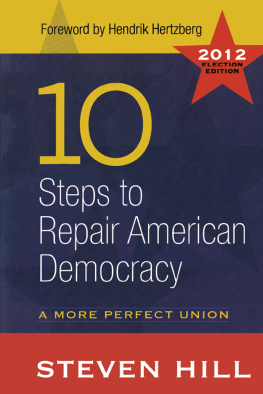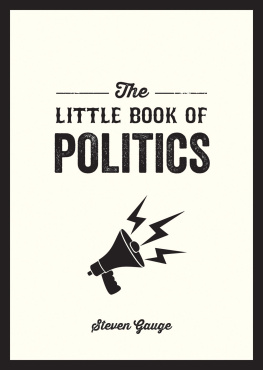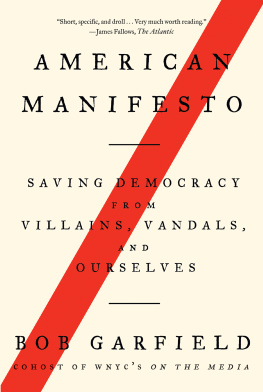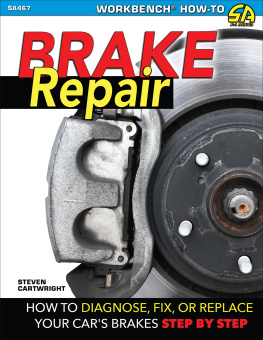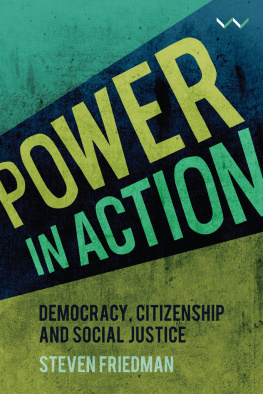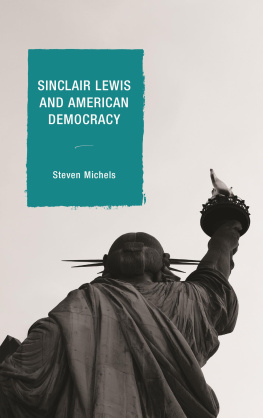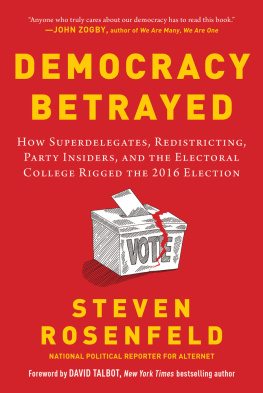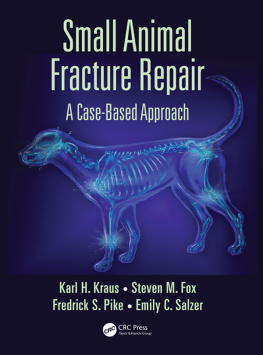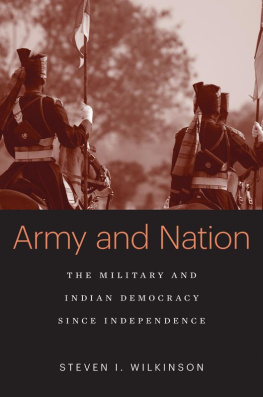First published 2012 by Paradigm Publishers
Published 2016 by Routledge
2 Park Square, Milton Park, Abingdon, Oxon OX14 4RN
711 Third Avenue, New York, NY 10017, USA
Routledge is an imprint of the Taylor & Francis Group, an informa business
Copyright 2012, Taylor & Francis.
All rights reserved. No part of this book may be reprinted or reproduced or utilised in any form or by any electronic, mechanical, or other means, now known or hereafter invented, including photocopying and recording, or in any information storage or retrieval system, without permission in writing from the publishers.
Notice:
Product or corporate names may be trademarks or registered trademarks, and are used only for identification and explanation without intent to infringe.
Library of Congress Cataloging-in-Publication Data
Hill, Steven, 1958
10 steps to repair American democracy : a more perfect union / Steven Hill. 2012 election ed.
p. cm.
Includes bibliographical references and index.
ISBN 978-1-61205-191-8 (hardcover : alk. paper) ISBN 978-1-61205-192-5 (pbk. : alk. paper)
1. United StatesPolitics and government20012009. 2. United StatesPolitics and government2009 3. DemocracyUnited States. I. Title. II. Title: Ten steps to repair American democracy.
JK275.H55 2012
320.973dc23
2011042240
ISBN 13 : 978-1-61205-191-8 (hbk)
ISBN 13 : 978-1-61205-192-5 (pbk)
Designed and Typeset by Straight Creek Bookmakers.
Hendrik Hertzberg
Americans and politics: Its the ultimate love-hate relationship.
On one side, our sentiments about our political arrangementsthat is, about our Constitution, not only the written document but also the institutions and customs and practices encrusted around itgo beyond love to outright worship. Ancestor worship, even. We consult the Constitution of the United States and the Federalist Papersthe Pentateuch and Talmud of our civic religionas the ultimate repositories of political revelation, eternally valid for every age and circumstance and incapable of improvement. Our foundersexcuse me, Founderswere all-seeing, all-knowing, godlike. What other nation has a capital city named for one long-ago politician and dominated by temples dedicated to the quasideification of others? We are, our leaders endlessly assure us, the greatest nation on earth. Therefore, our institutions and practices, which make us what we are, must be the greatest institutions and practices on earth. End of discussion.
Lucky us! Except we do nothing but complain, and our complaints, oddly, all seem to have to do with our institutions and practices. We hate politics. Politics is crooked; its fixed; its dominated by money; its manipulated by special interests; its shot through with dishonesty and pandering and betrayal and irresponsibility. And we dont like politicians much, eitherliving ones, anyway. (The dead ones, after a suitable interval, become demigods.) We revere our institutions, but we scorn the people who comprise them. We scorn them because theyre out of touch. Why dont they give us what we want? We scorn them because all they think about is getting reelected. Why dont they have the courage to defy the opinion polls? They must be especially wicked to have screwed things up so badly, because, after all, they start out with the advantage of being embedded in the greatest institutions on earth. Theyre hopeless. Its hopeless. So were hopeless.
Americans are right to revere the Founding Fathers. The machine they put together in Philadelphia in 1789 was a small miracle, maybe even a large one. At the time, it was the most advanced, most cutting-edge, and probably the most democraticeven if the Constitutions authors didnt use or even much like the wordsystem of government on earth. But, by the same token, the stagecoach was the most advanced form of land transportation on earth. Free government, even more than efficient transportation, remains a crucial goal. But shouldnt technological advances be taken advantage of?
After the 2000 election, when, for the first time in the modern democratic era, the United States ended up with a president who had received fewer votes than his principal opponent, it dawned on many Americans that our political technology was so outdated that it had begun to undermine our political ideals. There was widespread indignation about chaos and disfranchisement, accidental and purposeful, in Florida. Commissions issued reports calling for various modest reforms. The 2004 presidential election was also plagued by election administration snafus and charges of partisan malfeasance, especially in Ohio. The 2008 election was notable not only because it elected the first African American president but because it wasnt marred by allegations of either a screwed up or a stolen election. Yet, that wasnt necessarily because problems didnt occur; it was because that race was decided by a comfortable enough margin that any mistakes were not noticeable. Its when the race is close that the errors, whether they occur by accident or design, matter. But the problems go deeper than hanging chads, long voting lines, computerized voting, and sloppy voter rolls, and a growing number of Americans have begun to realize it.
Around the world, democracy has never been more popular or prevalent than it is today. But when new democracies emerge, as they did in the 1990s from Prague to Pretoria, the American model, apart from the Bill of Rights, is almost universally rejected. The international trend is decisively away from American-style winner-take-all elections. No one has adopted our electoral college method of executive selection. No new democracy has invested its upper chamber with the degree of power we bestow on our grossly unrepresentative Senate. We find ourselves in the middle of an embarrassing paradox: As the US government strives to spread democracy to places like the Middle East, fewer and fewer favor our institutions and practices.
Our geographically based, plurality, winner-take-all method of representation serves us especially poorly. Its why control of the House and the Senate is decided in a dozen districts and a half-dozen states, and in those districts and states, the issues dont necessarily cut the way they do in the country at large. If a position that might win millions of extra votes in New York and Californiastrong gun control, say, or tougher environmental protectionwill cost your party a few thousand votes in West Virginia, it isnt worth it. So Democrats stick to Social Security and Medicare, Republicans stick to terrorism and tax cuts, both sides stick to negative attacks, and the general public wonders why real issues arent being addressed.







